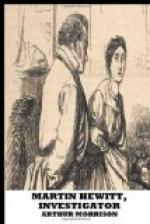Sir James listened to Hewitt’s explanation with many expressions of assent and some of surprise. When it was over, he smoked a few whiffs and then said: “But Mrs. Armitage’s brooch was pawned, and by a woman.”
“Exactly. I expect our friend Lloyd was rather disgusted at his small luck—probably gave the brooch to some female connection in London, and she realized on it. Such persons don’t always trouble to give a correct address.”
The two smoked in silence for a few minutes, and then Hewitt continued: “I don’t expect our friend has had an easy job altogether with that bird. His successes at most have only been three, and I suspect he had many failures and not a few anxious moments that we know nothing of. I should judge as much merely from what the groom told me of frequently meeting Lloyd with his parrot. But the plan was not a bad one—not at all. Even if the bird had been caught in the act, it would only have been ’That mischievous parrot!’ you see. And his master would only have been looking for him.”
II.
THE LOSS OF SAMMY CROCKETT.
It was, of course, always a part of Martin Hewitt’s business to be thoroughly at home among any and every class of people, and to be able to interest himself intelligently, or to appear to do so, in their various pursuits. In one of the most important cases ever placed in his hands he could have gone but a short way toward success had he not displayed some knowledge of the more sordid aspects of professional sport, and a great interest in the undertakings of a certain dealer therein.
The great case itself had nothing to do with sport, and, indeed, from a narrative point of view, was somewhat uninteresting, but the man who alone held the one piece of information wanted was a keeper, backer, or “gaffer” of professional pedestrians, and it was through the medium of his pecuniary interest in such matters that Hewitt was enabled to strike a bargain with him.
The man was a publican on the outskirts of Padfield, a northern town, pretty famous for its sporting tastes, and to Padfield, therefore, Hewitt betook himself, and, arrayed in a way to indicate some inclination of his own toward sport, he began to frequent the bar of the Hare and Hounds. Kentish, the landlord, was a stout, bull-necked man, of no great communicativeness at first; but after a little acquaintance he opened out wonderfully, became quite a jolly (and rather intelligent) companion, and came out with innumerable anecdotes of his sporting adventures. He could put a very decent dinner on the table, too, at the Hare and Hounds, and Hewitt’s frequent invitation to him to join therein and divide a bottle of the best in the cellar soon put the two on the very best of terms. Good terms with Mr. Kentish was Hewitt’s great desire, for the information he wanted was of a sort that could never be extracted by casual questioning, but must be a matter of open communication by the publican, extracted in what way it might be.




